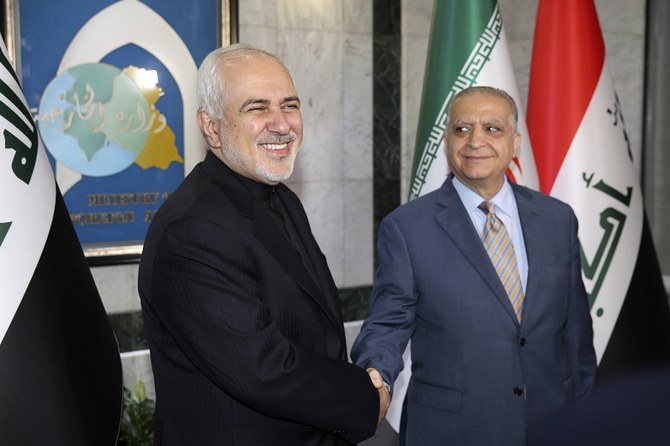How to deal with Iran’s proposed non-aggression pact

Iran’s defense and foreign ministers have reiterated their call for a non-aggression pact between their country, Saudi Arabia and the UAE. This has been seen as a remarkable step forward by Tehran and a valuable opportunity to end dangerous tensions. This would be true if the offer was honest.
This situation reminds us of what happened in 1989, when Iraq’s then-President Saddam Hussein initiated a proposal to King Fahd to sign a non-aggression pact with Saudi Arabia. It was signed by both parties before King Fahd realized, after Iraq’s invasion of Kuwait the following year, that the agreement was an attempt by Saddam to neutralize the Saudi position on the invasion.
Generally speaking, “non-aggression” in this context means direct war launched by Iran against Saudi Arabia and the UAE, or vice versa. Had Iran been serious about its desire for peace with its neighbors, it would have made a clear offer through diplomatic channels and mediators rather than via the media. Foreign Minister Mohammed Javad Zarif’s statement suggests that this is only an attempt to divide public opinion in the region and convince Arabs that Iran wants peace, while the Americans are the ones seeking war.
Tehran has not changed. Even North Korea’s defiance does not exceed its borders, unlike Iran, whose troops and militias are spread across the region
Abdulrahman Al-Rashed
The problem with Iran is that it is not a state and an army in the traditional sense. It is, rather, an authoritarian system guided by militias spread throughout the region. For instance, Iran is in a state of continuous aggression against Lebanon, where it has established a party with an armed militia that dominates the country and decides its policies. The Houthis in Yemen are an armed militia also known as “Ansar Al-Allah.” They are armed by Iran, as are similar militias in Iraq.
So how can a non-aggression pact be signed with Tehran when it has militias and would not consider them to be bound by the agreement? Furthermore, there is no mechanism or guarantee for such an agreement between two sides that lack trust in each other.
Safeguards accompanying such agreements are based on steps taken to reduce the possibility of aggression, such as downsizing armies, ending offensive armaments, adopting a monitoring mechanism, abandoning incitement, and so on.
Indeed, Saudi Arabia has always had disappointing experiences of reconciliation with Iran. In 1998, an agreement was signed by Prince Nayef bin Abdul Aziz, the Kingdom’s then-interior minister, and Hassan Rouhani, Iran’s then-intelligence chief and current president. Embassies were reopened, trade missions were exchanged, and both countries’ air carriers were allowed to operate in the other’s airspace.
However, it did not take long for the Saudis to discover Tehran’s deception and its creation of hostile local cells, as well as the use of Iranian airliners for smuggling. So relations were severed, and the situation became worse than before the agreement.
Today, Saudi Arabia, the UAE and the other Gulf countries, with the possible exception of Qatar, are all willing to end the four decades-long crisis, but Iran has neither changed its philosophy nor its activities since its first Supreme Leader Ruhollah Khomeini announced at the start of the 1979 revolution his intention to change regimes in the Gulf and the wider region.
Tehran has not changed. Even North Korea’s defiance does not exceed its borders, unlike Iran, whose troops and militias are spread across the region. Thus, we cannot believe the press statements of officials who propose a non-aggression treaty, and consider this a step forward. If they were serious, it would not take Iran’s leaders long to announce the end of their ties with the Houthis in Yemen or their arming of Hezbollah in Lebanon.
Would it be possible? I doubt it.
- Abdulrahman Al-Rashed is a veteran columnist. He is the former general manager of Al Arabiya news channel, and former editor in chief of Asharq Al-Awsat. Twitter: @aalrashed









































